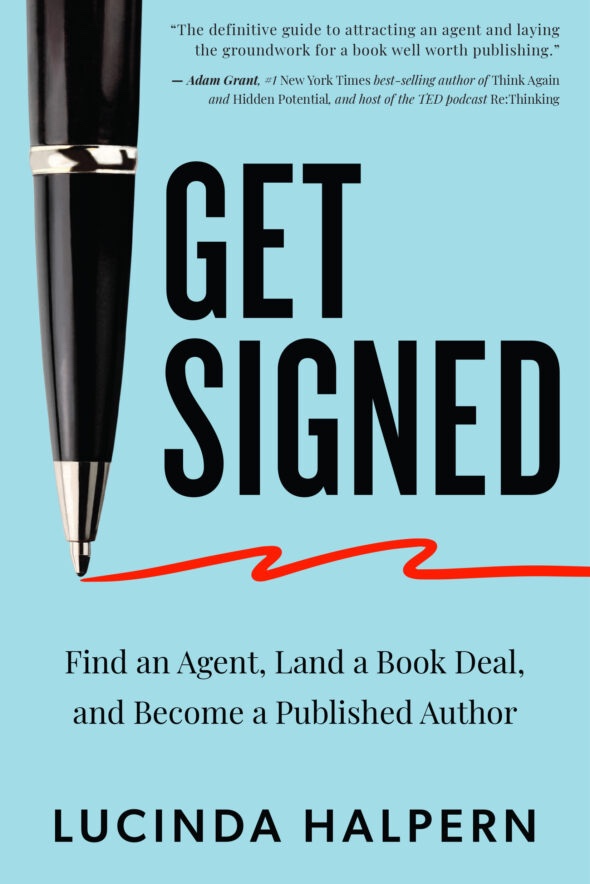Search
The Secrets of Highly Successful Authors
Lucinda Halpern shared her latest publishing insights from this month on the topic: The Secrets of Highly Successful Authors.
Read on to see her latest news, and if you’d like to receive her monthly newsletter directly in your inbox, sign up here.
# # #
How often have you asked yourself, “How do I get signed with an agent?”
There’s a better question I encourage you to ask. It’s this: “What is it that successful first-time authors do differently?”
Whether you ultimately self-publish, hybrid publish, or take the traditional route of finding an agent and book publisher, a successful book is a successful book. An industry expert scouting your work & platform or reviewing your query submission will spot that potential at the start. There isn’t a perfect formula for becoming a successful author, but there are proven best practices that writers can adopt now to give their own books the greatest chance of breaking through, whether to agents, publishers, or readers.
So for this issue, with gratitude for all the writers I have worked with, I am sharing some effective pitching practices and mental habits I learned from successful authors and then strived to apply myself, in the interest of paying it forward to all aspiring authors out there.
Here’s the successful author cheat sheet:
1. They find the right experts.
The first thing that attracts me to a prospective author is when they can admit: “I know what I don’t know.” This simple phrase expresses the curiosity of a beginner’s mindset, and a willingness to listen to the experts.
The fact of the matter is this: agents and authors are looking to you as the expert on your characters, your story, or the audience you already reach. You aren’t expected to be an expert in book publishing, since that’s our role!
Successful authors understand it “takes a village” to publish a book, and sometimes even to write one. The number of authors our agency represents who have hired outside editors or ghostwriters, along with those at similar agencies, is more than you think—not because these authors are not capable writers, but because they know that asking for help isn’t a weakness.
We are proud to represent book collaborators of all kinds at Lucinda Literary. They are the secret weapon behind so many book deals, and even more bestsellers.
2. They pay attention to who’s doing what in their space.
Here’s what I’ve found surprising over the years: so many authors are writing without reading or at least familiarizing themselves with the new and popular books in their genre. They haven’t reverse engineered why those books have appealed to readers in the first place, and identified what their work is doing differently.
When I teach writers in the various classes we offer at Lucinda Literary, I often talk about the importance of market research. Many writers posed with the fundamental question “What are your comps (comparable titles)?” will exclaim, “There are no right comps for my book.” Often, writers are thinking of this question in the wrong way. Agents and editors want proof that an element of your book has worked well in the market, so writers should think broadly when responding to this question. Surely there is a recent book that resembles yours in its themes, its voice, or its audience! And maybe another author’s profile is a lot like yours: a psychologist, a coach, a writer who has been published elsewhere, or maybe emerged as a surprising debut talent.
In the grand scheme of comps and book positioning, the most successful authors have done their research. They can make the case to editors, and later to the media, why their books have unique appeal. They often go the extra step to follow those who they admire on social media, and take note of how they’re positioning their work. And they begin to engage with those leaders in the genre. Which takes me to my next point…
3. They network.
This fundamental practice begins when you first query agents, long before your book is slated for publication. In fact, I’d argue that most authors I sign start even earlier—they are talking to experts long before they are querying, simply absorbing best practices, editorial advice, and building relationships. Unlike hiring experts, this critical aspect of book publishing success comes free. But it does require, to borrow from the vocabulary of the writer types I discuss in my book Get Signed, the research of a “Data Collector” and the courage of a “Crusader.” You need to read those you admire, and then you need to find creative ways to make the connection.
When I recently did a back-of-envelope audit of authors I’d personally signed over the years, I noticed that most did not approach agents through the proverbial ‘slush pile’ alone. They had built a bridge of connections that ultimately led to agent introductions. They had followed these agents on social media, or attended events where these agents could be found. They were out there ‘getting seen’—either through writing articles for publications, building a YouTube channel, or committing to a Substack.
Consider an entry into book publishing just as you would a job application into any competitive industry. So much of it comes down to networking.
Later, an author’s network will lend invaluable insights, guide them through sticky situations, and of course serve as megaphones for a book’s release. A publisher’s implicit question, that an author and an agent must answer, is always: “Who can this person call in for favors?” and “Are they prepared to call in all the favors?”
4. They are leaders, not followers.
This trait is one people find surprising to hear, and it’s possible that it’s unique to my approach and relationships… but I love a visionary who isn’t afraid to debate and push back. I love less the writer who seeks, or worse, bends to a host of judgements including blindly following my own or “the market’s” opinions. How often I’ve seen an author’s earliest vision for their title become what was best for the book’s cover all along. Other times, I’ve seen our authors step away from their entire book because one editor shot it down. No, no, no!
(I wasn’t able to rescue all of my orphans, sadly, but in those instances where authors kept in the fight, the outcomes were better than imagined.)
How many writers in our community ask me “what’s most marketable right now; literary or commercial fiction? Does my novel need to be fantasy?” Well, I don’t know—what do you think? I’m being playful, because I do understand the quandary of the writer brand new to the industry, but from experience, I can tell you it’s the visionaries who succeed. They’re not following the rules or what’s been done before simply because that’s what they’re told sells. They stay true to their art, their mission, or what they uniquely know are the needs of their audience. If the market doesn’t see it, they self-publish. If they’re given low advances, their attitude is: I can’t wait to prove them wrong.
5. They know that their own marketing and publicity efforts are what drives a book’s success.
We’ve all heard the refrain: publishers don’t do publicity anymore.
This is untrue. It just used to be a heck of a lot easier and more straightforward. Oh, and they weren’t dealing with a rush of supply and tumultuous market demand.
Because the landscape of publishing has changed so drastically in recent years, publishers care more than ever about an author’s platform, especially in certain genres of nonfiction, like self-help or memoir. And yes, this means you will be expected to generate buzz and book sales on the basis of your platform, which can very much include the network you’ve established and are continuing to build and nurture. In-house marketing and publicity teams are notoriously oversubscribed and underpaid; they work for a publisher, not your particular book. But they are lovers of books, hence their reason for entering publishing in the first place, so give them credit for trying their best. Know that you are ultimately the person penning the articles, writing the editors, pitching the podcasts, and galvanizing the troops. After all, they want to hear from you.
6. They focus on the right things.
While on the topic of publicity, it’s important to reveal another mentality of the highly successful author: focus. This is the author who gives their publisher every bit of material and input needed in making the pitch to GMA, The Atlantic, or the New York Times, but if that doesn’t yield, quickly moves on to the next part of the campaign without licking their wounds, ready to pivot to where the enthusiasm for their book is cropping up most.
his author knows that content is king, and is prepared to put out a lot of it: on social media, on podcasts, on YouTube, on a blog or Substack, in an original op-ed or essay. I’m not saying you need to or even should do all of this! But authors must keep in mind that the media, like the publisher, is looking at you to be the creator. If you’re simply waiting around, as a first-time unknown, for a media outlet to do the work of profiling you or your book, be prepared to spend a lot of time wishing and hoping. Instead, control the things you can, which means removing yourself from your inbox to make dedicated time for all the content you will be sharing with the media, and the world.
On a similar note, while authors focus on the publicity they did or didn’t receive, they too often lose track of the importance of Amazon reviews, or straight up book sales. Social proof, demonstrated on Amazon, should be one of your largest priorities—and it isn’t a simple ask via a mass email, by the way. You’ll need to determine the why and the win-win for why anyone, including your own family, should make the time to draft an Amazon review.
Ultimately, social proof sells books, and book sales are what make a publisher want to buy your next book, not the publicity you received, and not even if, at one moment in time, you hit a bestseller’s list.
7. They make great partners.
I’ll let you in on why agents and editors got into this business in the first place. It isn’t just a love of books, or the thrill of discovering new talent. It’s because we want to learn something new. The very few new clients I cannot resist are those who are generous with their insights. Even when I read fiction or memoir this applies—I’m learning about a world I didn’t know; I’m exploring a new way of relating to the world.
Successful authors value these first and important relationships deeply. Once they are signed, and developing a project with an agent, they receive feedback gracefully and gratefully, even if (to my point above) this can mean advocating for a different point of view or storyline. The same is true when they enter into a relationship with a book editor.
These authors appreciate their entire publishing teams. They keep morale and optimism high even when results from the media or in book sales disappoint. They don’t go into hiding and resentment, and alienate the very village that supports them. They are both leaders and team players. A book can have a long career, but you have to keep the troops fighting for it. And if your team feels defeated or unappreciated, that’s rarely possible.
In fact, as the 80/20 rule applies, authors who are independent—relying less on their publishing relationships and more on themselves—are the authors I’ve found most successful. They use their publishing teams as allies.
8. They understand that books are just one part of an entire career.
When publishers evaluate a book’s potential, they are looking at how it fits into the entire ecosystem of your name and work. As examples, for fiction and memoir writers: has your writing been published anywhere previously? For nonfiction writers, is the book a part of a vibrant brand or speaking career? For both, is there a documentary or film or podcast that suggests an audience for your work?
When they take their eye off the ball of your greater business, authors risk losing the vital machinery (and their livelihood) that makes for a successful book in the first place. It’s essential to keep readers coming for trusted value and content, and begin to think of the next project, if the first book you are querying with or publishing isn’t finding the commercial success you had hoped.
Remember that as your star rises, so do your book sales.
9. They remember their readers.
An agent or a publisher isn’t publishing you because you want to write a book and see it on shelves. Quite the opposite: they are buying a potential readership.
While it’s nearly impossible not to fall prey to ego when you have reached the apex of book success—the agent, the book deal, the launch, the press—successful authors remember to put their readers first, they listen to them, and they keep delivering (free) value content as they continuously beat the drum for whatever message or story or truth they are trying to tell.








